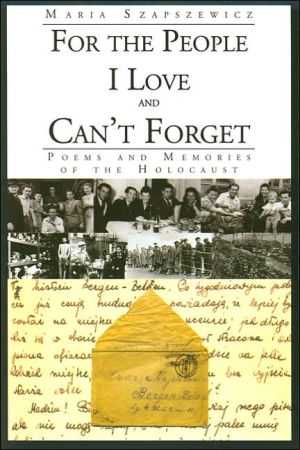
For The People I Love and Can't Forget – Poems and Memories of the Holocaust
Sunday to Thursday: 09:00-17:00
Fridays and Holiday eves: 09:00-14:00
Yad Vashem is closed on Saturdays and all Jewish Holidays.
Entrance to the Holocaust History Museum is not permitted for children under the age of 10. Babies in strollers or carriers will not be permitted to enter.

For The People I Love and Can't Forget – Poems and Memories of the Holocaust
For The People I Love and Can't Forget: Poems and Memories of the Holocaust
Maria Szapszewicz
Jacob's House Press, 2006
194 pages
Born in Lodz, Maria (nee Wajchendler) survived the Holocaust, as did her mother and one brother. Her other brother, father, and extended family perished. She spent time in the Lodz and Szydlowiec ghettos, worked in an ammunition factory in Starochowice, and was eventually sent to Auschwitz. She was liberated in the Bergen Belsen Nazi concentration camp.
In 1959 Maria was allowed to leave Poland, and she settled in St. Louis, Missouri. Later her husband and two small daughters joined her. A proud docent of the Holocaust Museum and Learning Center in St. Louis, Missouri, she speaks regularly to groups of young students and other visitors about her experiences during the Holocaust.
In addition to the forty-seven poems, the book contains essays and short stories. She also incorporates stories told to her by her late husband Jacob. She bears witness to her Holocaust experiences through her writings and has an obvious talent in being able to express her feelings and memories. The book covers many topics, touching on her family life before the Holocaust and the home she loved, life in the shtetl, the ghetto, the Auschwitz-Birkenau extermination camp, her family and friendship during the Holocaust, and the Righteous Among the Nations.
Each story, based on Maria's memory, is unique. For example, she describes how she is able to hold on to life through the discovery of a beautiful little flower growing in the camp, pushing its way up through the snow. It is her secret, until it dies, but it gave her hope in the struggle for survival. In another she describes Simon Who Fought Back. Simon, like millions of others like him is shot by the Nazis, but not forgotten by Maria, who remembers him and has immortalized him through her poetry.
A lengthy interview given by Maria to the Imperial War Museum Archive in 1997, chronicling her Holocaust experiences, is also included.
Recalling her experiences on the transport to Auschwitz and in the Nazi extermination camp, she writes "We knew we were going to die, / But still on our lips / was the question, Why?" ("The Long Journey to Hell").
In "For Those Innocent People I Loved" we read:
My heart is crying
For those who are dying.
My heart is crying
For the children who are dying.
Not knowing what it means to be dead,
They are marching to the gas chambers,
Holding high their heads.
My heart is crying
For their mothers and fathers;
Holding onto their children tight,
They know the Germans' might.
Even so, some of them try to fight.
My heart is crying,
O dear G-d, why do You not hear our cry?
In her poem "The Home I Loved", dedicated to her husband Jacob Szapszewicz, she asks, "Why was it taken away from me, dear Lord?"
However, throughout her ordeal it seems she has retained her belief in G-d, and maintained an optimistic and positive outlook.
Reflecting on life after the Holocaust she writes:
"Life was continuing its course.
We had to go on.
We realized we could not mourn forever.
They say time heals; time consoles.
But our memories and pain will last forever.
We cannot forget our loved ones. Never."
This book, Maria's legacy to her children and grandchildren, provides readers with a detailed insight into the window of a Holocaust survivor's experiences. Overall, this book is difficult to put down, raising many open-ended questions.

Thank you for registering to receive information from Yad Vashem.
You will receive periodic updates regarding recent events, publications and new initiatives.

"The work of Yad Vashem is critical and necessary to remind the world of the consequences of hate"
Paul Daly
#GivingTuesday
Donate to Educate Against Hate


Worldwide antisemitism is on the rise.
At Yad Vashem, we strive to make the world a better place by combating antisemitism through teacher training, international lectures and workshops and online courses.
We need you to partner with us in this vital mission to #EducateAgainstHate
The good news:
The Yad Vashem website had recently undergone a major upgrade!
The less good news:
The page you are looking for has apparently been moved.
We are therefore redirecting you to what we hope will be a useful landing page.
For any questions/clarifications/problems, please contact: webmaster@yadvashem.org.il
Press the X button to continue



